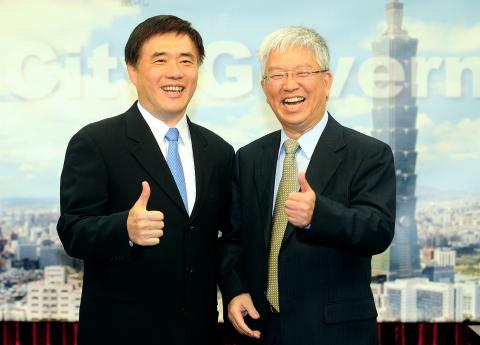Taipei Mayor Hau Lung-bin (郝龍斌) yesterday named real-estate expert Chang Chin-oh (張金鶚) as the city’s new deputy mayor, saying that Chang is well equipped to lead efforts to resolve the deadlock on the Wenlin Yuan (文林苑) urban renewal project in Shilin District (士林) and facilitate overall urban development.
Chang, 60, will on April 1 assume the post left vacant by Executive Yuan Secretary-General Chen Wei-zen (陳威仁) last month.
As a land economics professor at National Chengchi University and outspoken critic of the skyrocketing prices in the real-estate market, Chang also drew the attention of the pan-green camp, which enlisted him to help draft a white paper on housing policy for Democratic Progressive Party Chairman Su Tseng-chang (蘇貞昌) when Su ran for Taipei mayor in 2010.

Photo: Lin Cheng-kung, Taipei Times
Chang yesterday promised to address the issue of housing prices and promote urban development.
“Taipei will not move forward if it does not continue to carry out urban development projects. However, the Wenlin Yuan case has sparked some concern about urban renewal, so my priority is to resolve these concerns and restart the city’s urban renewal,” he said.
The Wenlin Yuan project involves the demolition of decades-old apartment buildings to make way for a high-rise luxury apartment complex.
While the majority of the neighborhood’s residents — 36 households — agreed to the project, one of the households, the Wang (王) family, which owned two townhouses, refused to give up their properties.
The city government forcefully tore down the houses in March last year, sparking an ongoing protest from the family and their supporters. No consensus has yet been reached between the developer, the Wang family and the residents of the 36 other households.
Chang served on the Taipei urban renewal advisory panel that last year studied urban renewal regulations and mechanisms in a failed attempt to resolve the standoff. Yesterday, he proposed solving the issue by providing a negotiation platform by mediated civic groups.
Hau yesterday expressed confidence that he and Chang would find a solution to the stalled project, adding that he would arrange meetings between the concerned parties within the next two weeks.
Hau also said he expected the new deputy mayor would be able to put his real-estate expertise to good use in pushing forward other public housing projects and urban renewal developments to provide residents with affordable housing, a priority of the Taipei City Government.
“The housing market in Taipei is overpriced and living in the city is becoming increasingly harder for younger residents. We hope that having Chang on board will help us tackle issues of housing justice and urban renewal,” Hau said.
Although he promised to address the Wenlin Yuan project, Chang said he is not aiming to become known as the “Wenlin Yuan deputy mayor.” He pledged to focus on a range of issues, such as the overpriced real-estate market, by setting up channels of dialogue to make house prices transparent to Taipei residents.

MAKING WAVES: China’s maritime militia could become a nontraditional threat in war, clogging up shipping lanes to prevent US or Japanese intervention, a report said About 1,900 Chinese ships flying flags of convenience and fishing vessels that participated in China’s military exercises around Taiwan last month and in January last year have been listed for monitoring, Coast Guard Administration (CGA) Deputy Director-General Hsieh Ching-chin (謝慶欽) said yesterday. Following amendments to the Commercial Port Act (商港法) and the Law of Ships (船舶法) last month, the CGA can designate possible berthing areas or deny ports of call for vessels suspected of loitering around areas where undersea cables can be accessed, Oceans Affairs Council Minister Kuan Bi-ling (管碧玲) said. The list of suspected ships, originally 300, had risen to about

DAREDEVIL: Honnold said it had always been a dream of his to climb Taipei 101, while a Netflix producer said the skyscraper was ‘a real icon of this country’ US climber Alex Honnold yesterday took on Taiwan’s tallest building, becoming the first person to scale Taipei 101 without a rope, harness or safety net. Hundreds of spectators gathered at the base of the 101-story skyscraper to watch Honnold, 40, embark on his daredevil feat, which was also broadcast live on Netflix. Dressed in a red T-shirt and yellow custom-made climbing shoes, Honnold swiftly moved up the southeast face of the glass and steel building. At one point, he stepped onto a platform midway up to wave down at fans and onlookers who were taking photos. People watching from inside

Japan’s strategic alliance with the US would collapse if Tokyo were to turn away from a conflict in Taiwan, Japanese Prime Minister Sanae Takaichi said yesterday, but distanced herself from previous comments that suggested a possible military response in such an event. Takaichi expressed her latest views on a nationally broadcast TV program late on Monday, where an opposition party leader criticized her for igniting tensions with China with the earlier remarks. Ties between Japan and China have sunk to the worst level in years after Takaichi said in November that a hypothetical Chinese attack on Taiwan could bring about a Japanese

STREAMLINED: The dedicated funding would allow the US to transfer equipment to Taiwan when needed and order upgraded replacements for stockpiles, a source said The US House of Representatives on Thursday passed a defense appropriations bill totaling US$838.7 billion, of which US$1 billion is to be allocated to reinforcing security cooperation with Taiwan and US$150 million to replace defense articles provided to the nation. These are part of the Consolidated Appropriation Act, which the US House yesterday passed with 341 votes in favor and 88 against. The act must be passed by the US Senate before Friday next week to avoid another government shutdown. The US House Committee on Appropriations on Monday unveiled the act, saying that it allocates US$1 billion for the Taiwan Security Cooperation Initiative